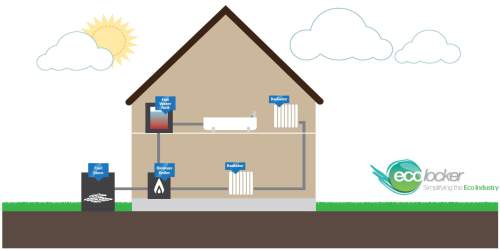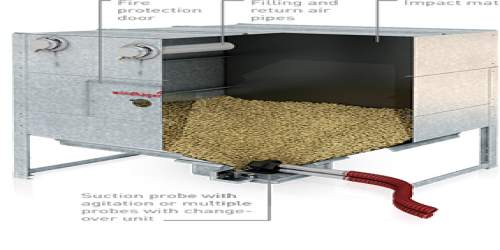Read Time : 3 Minutes
Is a Biomass Boiler suitable for my Property?
Biomass boiler systems are not suitable for every property. Given the high space requirement compared with conventional fossil fuel boilers (NB: new boilers have now come on to the market that take up very little space, so with the correct flue, will be suitable for almost all properties), small urban and suburban properties (especially flats) are highly unlikely to be able to accommodate a larger biomass boiler, hopper and buffer vessel, and are therefore better suited to other renewable energy technologies such as solar PV and solar thermal or even a wall mounted air source heat pump.
Even with those urban and suburban properties that do have enough space for the biomass installations, there may still be access issues when it comes to taking delivery (and more importantly storage) of the wood fuel, normally delivered on a standard sized pallet. For homes and businesses with the requisite space, however, biomass boilers are likely to be suitable and can provide substantial financial savings, as well as a significantly lower carbon footprint. Biomass systems with an output of 5kW to 500kW can be used in a variety of settings, both residential and commercial, from a small office building to large buildings such as hospitals, schools and prisons.
Biomass boilers are also a particularly attractive option for properties with no mains gas supply. Large biomass systems are also a viable option for community and communal housing renewable energy projects, and may be eligible for grants or subsidies from the UK government or from the European Union. Community heating projects, which are more cost effective due to the use of one large central boiler, are already very common in mainland Europe (especially in Scandinavian countries), but are becoming more and more common in the UK. District heating currently provides around 2% of the UK’s heat requirements. For more information on district heating schemes, see the Department for Energy and Climate Change (DECC) website. The Energy Saving Trust’s website has useful information on biomass systems for communities, as well as additional information on funding sources.
The Government-run Biomass Energy Centre website has a useful table of energy requirements and recommended system sizes for different types of building. Individual factors will apply to every proposed installation site and may impact upon the system’s viability, so it is always a good idea to discuss your property’s specifications and requirements with a qualified biomass heating installer (who may also undertake a survey) before taking a final decision. For larger installations (or indeed all installations) it is always advisable to undertake a feasibility study before making final decisions on biomass systems.
COMPARE PRICES FROM LOCAL INSTALLERS
Compare prices from local companies fast & free
Enter your postcode to compare quotes from leading professionals. We promise to keep your information Safe & Secure. Privacy Policy
Integrating a Biomass Boiler with existing systems
As with any other type of boiler, it is quite possible and normal to integrate a new biomass boiler into a property’s existing heating system by connecting to radiators, water tanks and under floor heating. The boiler can either be controlled using your existing control panel, or a new one can be installed. All biomass systems use a flue (like a duct or chimney) to release the gases produced during combustion. Flues can in many cases be placed inside your property’s existing chimney, though minor work may be needed in order to line it. Alternatively, the flue can be installed outside, although this may require planning permission.
If your property does not have an existing wet heating system or if it does have one but it is in need of being replaced, it may be very costly to install this and a biomass boiler may not be suitable. If this is the case, it may be better to consider an air-to-air heat pump. Another necessary consideration is the availability of space for the boiler, fuel store, flue and other parts in and around the property. Given that biomass boilers tend to be much larger than conventional fossil fuel boilers, it may be necessary to either construct a separate boiler house or extend the existing building. The suitability of biomass systems for each property depends on individual factors, however, and it is always a good idea to discuss your plans with a qualified installer and/or heating engineer before making any final decisions. It is also possible to install a biomass system as backup in order to supplement your existing boiler, though this will not offer such a large reduction in terms of carbon footprint.
Planning permission associated with installing a Biomass Boiler
In the case of small domestic and business installations, where the aesthetic impact is limited, biomass heating systems are likely to be considered ‘permitted development’ by local authorities, which means that no planning permission will be necessary. It is nevertheless always a good idea to check with your local authority prior to installing any kind of renewable energy technology. Installing a flue on the outside of a property is also usually classed as permitted development, unless it affects the roof line.
Other restrictions may apply, for example, if the proposed installation site is listed or if it is situated in a World Heritage site or conservation area. Some areas in the UK are designated ‘Air Quality Management Areas’. If you live in one such area and wish to install a biomass heating system, you may require an exemption certificate. It is for this reason that it wise to discuss your plans with local authorities before making any decisions. You can find details for your local authority on the Direct.gov website.
If you need to construct a new building in which to house the boiler and silo you may require planning permission. Medium to large size installations for businesses, organisations and communities are likely to require planning permission as they will almost certainly involve building work. All new or retrofit biomass installations must also comply with building regulations. For more information, see the Government’s Planning Portal website. More information on the permitted development regulations for biomass boilers can be found here.
Find a local installer
Welcome to the biggest directory of UK renewable energy companies





 Is a Biomass Boiler suitable for my Property?
Is a Biomass Boiler suitable for my Property?





